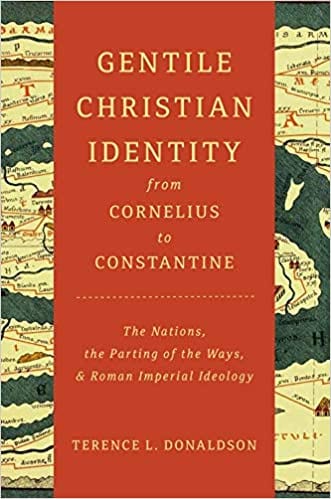Terry Donaldson is a top drawer scholar who for some time has worked in the social side of the discipline of NT studies, and in this case the social scientific theory of social identity, which is used to study the development of self-understanding in earliest Christianity. In particular this is an examination primarily of the evolving uses of the Greek term ethne. This book is a detailed, carefully researched important study of more than 550 pages complete with copious notes and insights. On Amazon the content of the book is summarized as follows:
“Originally an ascribed identity that cast non-Jewish Christ-believers as an ethnic other, “gentile” soon evolved into a much more complex aspect of early Christian identity. Gentile Christian Identity from Cornelius to Constantine is a full historical account of this trajectory, showing how, in the context of “the parting of the ways,” the early church increasingly identified itself as a distinctly gentile and anti-Judaic entity, even as it also crafted itself as an alternative to the cosmopolitan project of the Roman Empire. This process of identity construction shaped Christianity’s legacy, paradoxically establishing it as both a counter-empire and a mimicker of Rome’s imperial ideology.
Drawing on social identity theory and ethnography, Terence Donaldson offers an analysis of gentile Christianity that is thorough and highly relevant to today’s discourses surrounding identity, ethnicity, and Christian-Jewish relations. As Donaldson shows, a full understanding of the term “gentile” is key to understanding the modern Western world and the church as we know it.”
Here I will share some reservations about this particular reading of the data, but the careful reader will want to peruse the dialogue which follows this post in a series of posts. Firstly, the term ethne as Donaldson freely admits was used by Jews to ‘other’ everyone else who was not Jewish. The term does not literally mean ‘Gentile’ as we know the term today, the term means ethnic group or is less helpfully translated as nation. In view of the very different modern notion of nation states, which is not what the term really meant in the world of the first few centuries of the Christian movement, I avoid that translation. Ethne is in fact the word from which we get the term ‘ethnic’. Jews distinguished themselves from all other people groups or tribes or ethnicities. Not surprisingly early Jewish Christians picked up the term from their Jewish heritage and used it of both pagans and of converts to Christianity (see e.g. Rom. 9-11).
Secondly, it would have been more helpful if a wider lexicon of terms was examined along with ethne, for instance the term christianoi found in Acts applied to Christ followers in Antioch, or simply the term laoi. In other words, it would be helpful to know not only how Christians labelled themselves, but also how outsiders labelled them as well, and compare and contrast the two things.
Thirdly, while I agree that we do find clear evidence of the rise of anti-Judaism already in a document like the Epistle of Barnabas (which I would date to the second century A.D.) which develops into actual anti-Semitism when the church became largely Gentile in character, I think it is much more difficult to find actual anti-Semitism in the NT documents themselves. For example, the critique of ‘the Jews’ in the 4th Gospel is of the Jewish authorities who were opposed to Jesus, not a critique of Jews in general as the term is also used neutrally elsewhere in John. Further, as Donaldson himself points out, much of the critique of Judaism, for instance in Galatians or 1 Corinthians is in one sense an in-house critique— Jews arguing with Jews about the Law, and Jesus, and other subjects. This does not qualify as early evidence of anti-Semitism.
I have learned a lot from a careful reading of Donaldson’s most recent book, and one of the effects it has had on me, is just to increase the amount of regret and shame I feel about some of the actual anti-Semitism going well beyond a meaningful critique of Judaism we find in the Christian documents of the 2nd through 4th centuries A.D. There is a good reason some commentators have called anti-semitism ‘the original sin of the church’. But let’s let Terry Donaldson speak for himself— starting in the next blog post tomorrow.













